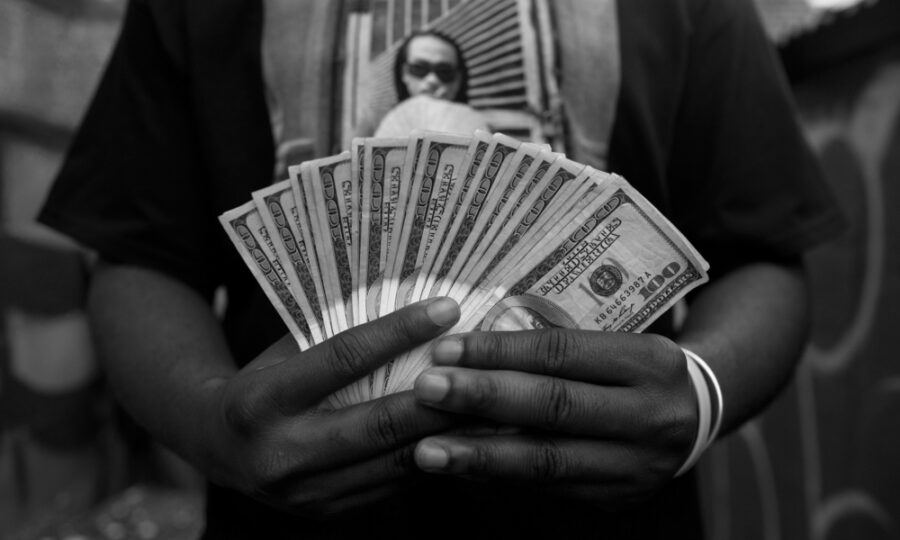You have heard it said, do not be lovers of self. But I say to you, within all my children burns a star.
“SERMON OF THE NIGHT QUEEN” THE BOOK OF INFERNAL PRAYER
One of the foundational myths of American history is the story of the Mayflower Pilgrims. While one could certainly quibble about the truth of this or that facet of the tale, the myth is meant to reinforce the American values of religious freedom and cross-cultural co-operation. While it is not stressed in the narrative as taught to children, the historical reality is that the story of the Plymouth colony is also one about how greed eventually saved a community of people. Because the Pilgrims were originally socialists, and that economic policy nearly destroyed them.
As Dr. Harvey Wish writes in Society and Thought in Early America, “[T]he Pilgrims, who had pooled their wealth to purchase the Mayflower, began as communists, sharing their lands in the Biblical spirit of apostolic communism.” The reference to “apostolic communism” references the Book of the Acts of the Apostles, which is a kind of history of the first few decades of the early Christian church. In the second chapter of that book it is said, “All the believers were together and had everything in common. They sold property and possessions to give to anyone who had need.” The demand to give over all of one’s property for the benefit of the community was so serious that the Apostle Peter miraculously struck a married couple dead when they attempted to lie about how much money they had received from the sale of their land (see the 5th chapter of the Book of Acts). While the early Christian tradition of communism would not be stressed among the laity as time went on, it would very much continue in the monastic tradition and would occasionally be revived by various Christian cults throughout history to this very day. The problem for the Pilgrims, as many communist collectives have discovered, is that the system didn’t work.
William Bradford, governor of the Plymouth colony, wrote of this socialism, “For this community (so far as it was) was found to breed much confusion and discontent and retard much employment that would have been to their benefit and comfort.” Young men complained of spending “their time and strength to work for other men’s wives and children without any recompense.” Strong men felt it an injustice that they were forced to shoulder an outsized portion of the workload with no compensation in return. Women, who were forced to cook and clean for husbands and children that were not their own, thought it a kind of slavery. This situation naturally bred resentment, and people became lax and lazy. With the expectation that someone else would or should do the work, less and less work actually got done. As a result, the colony wavered on the brink of collapse. It was the reinstatement of private property that pulled it back. As Bradford wrote:
And so assigned to every family a parcel of land, according to the proportion of their number for that end . . . This had a very good success; for it made all hands very industrious, so as much more corn was planted then otherwise would have been by any means the Governor or any other could use, and saved him a great deal of trouble, and gave far better content. The women now went willingly into the field, and took their little-ones with them to set corn, which before would allege weakness, and inability; whom to have compelled would have been thought great tyranny and oppression.
At the foundation of the infernal of virtue of Greed is a recognition of truths about human nature and existence. The problem with utopian political platforms, whether Communism on one extreme and Libertarian Anarchism on the other, is that they require denying reality to believe they might work. And for the Satanist, acknowledging reality should always be the starting point for deciding which course of action to take. As a god of truth, Lucifer challenges us to see the world for what it is rather than what we wish it to be. The same goes for ourselves.
Some readers might be annoyed that this essay has taken a distinctly political turn. “Keep your politics out of my Satanism.” It is more than fair to say that Theistic Satanism doesn’t require joining one particular political party. There is room in Theistic Satanism for differences in opinion when it comes to political beliefs. Satanism is not amorphous, however. It has philosophical principles that make certain political stances untenable for the faithful. You can’t believe in sexual freedom, for example, while also holding that homosexuality, polyamory, or prostitution should be punishable by law.
The same goes with regard to Greed being in opposition to communist political schemes and ideals. Satanism is an individualistic faith. As such, it is incompatible with any system of governance that systematically favors the collective at the expense of the individual. The fruit of your labors should largely be yours, not your neighbor’s. The responsibility of making decisions about your life should largely be yours, not a centralized planning committee’s. I say largely because, even though we are individuals first, we must always live in tension with the fact that we depend on others and share a common environment every day of our lives. For this reason, Satanism is not a justification for arguing that all taxes are theft, that corporate interests outweigh environmental concerns, that parents have no right to make decisions for the minors under their care, or any other similar nonsense. We hold the individual as primary, but that doesn’t mean we can or should disregard the collective entirely. We encourage individual Greed, but not without limit.
Underscoring the above praise of selfishness, one-time Magister of the Church of Satan, Michael Aquino wrote:
Socialism and communism…place the good of the community before individual desires. …The many unsuccessful individuals resent and envy the few successful ones, and the democratic vote had enabled demagogues to play upon this dissatisfaction, promising equality of result rather than that of opportunity. Frequently the actual consequences of such campaigns are aggravating to the elites (who feel constricted and cheated of the fruits of their abilities) as well as to the masses (who feel humiliated and useless). The elites lose any sense of social responsibility they might have had, and the masses lose their sense of self-reliance… Was it [the endorsement of individualism] also Satanic? Yes, in the sense that Satan’s great “sin” was ultimately that of individualism. In order to follow the dictates of his own will, he broke away from the collective will of God, regardless of its “social beneficence”.
THE CHURCH OF SATAN
Anton LaVey once described Greed as simply wanting more than what you currently have. A properly constituted sense of Greed (i.e., neither boundless or compulsive) is an integral part of healthy individualism as it is intrinsically self-oriented. It was this self-orientation that led the Church to condemn money making almost entirely, so that St. Jerome remarked, “A man who is a merchant can seldom if ever please God.” Never mind salvation, common wisdom claims that money can’t even buy happiness, but psychological and economic studies suggest otherwise. Daniel Kahneman and Angus Deaton’s 2010 research found that “low income is associated both with low life evaluation and low emotional well-being,” while higher income correlated with better life satisfaction and emotional well-being. They noted, however, that once an individual surpassed an annual income of $75,000 ($90,000 in 2023 terms) they ceased to see gains in perceived happiness. A more recent study by Matthew Killingsworth, however, calls this income ceiling into question. His research found “no evidence of an income threshold at which experienced and evaluative well-being diverged, suggesting that higher incomes are associated with both feeling better day-to-day and being more satisfied with life overall.”
Selfishness is complex and can paradoxically benefit others we never consciously intended to help, a fact that was recognized by Adam Smith, the grandfather of capitalism. I work a job to sustain my own life, but the work I do benefits my employer as well. The products we make benefit our customers, and the materials we purchase to make them benefits the vendors who sell them to us. The money I spend to get back and forth to that job, and that my work spends to make sure I have the tools to succeed, benefits any number of businesses around the world. The money I bring home benefits my children. The taxes I pay benefit my neighbors and fellow citizens. The point is that while my economic intentions are motivated by self-concern, their actual effects are part of a complex and mutually beneficial web of economic relationships.
As with all the infernal virtues, it is of course possible to go too far with one’s pursuit of fortune. When money becomes an end, rather than a means, it is more likely to hollow out our lives than enhance them. Furthermore, how you make your money can play a crucial role in determining your sense of happiness and well-being. Most people don’t get to work their dream job, and I seriously doubt Satanists are any better off in this regard. Sometimes you have to be thankful you have work at all. But, if your work is destroying your health, family, or social life—or involving you in criminal pursuits that imperil your life and freedom—it may make sense to take a pay cut in the pursuit of something that fits more holistically in your life.
Still, more money typically means access to better healthcare, better housing, better education, a better standard of living, and more opportunity to pursue the life one desires to lead. Those are all things you should want for yourself as a Satanist. Go and seize them, and may Lilith and Satan bless your efforts.




